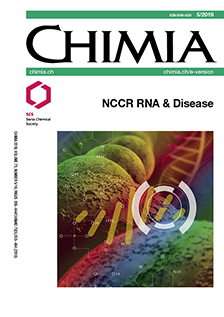tRNA Biology in Trypanosomes
31118122
DOI:
https://doi.org/10.2533/chimia.2019.395Keywords:
Aminoacyl-trna synthetases, Trna, Trna-derived fragments, Trna modification, Trypanosoma bruceiAbstract
Besides their medical importance, the parasitic protozoan Trypanosoma brucei and its relatives are experimentally highly accessible model systems for many cell biological processes. Trypanosomes are phylogenetically essentially unrelated to the popular model eukaryotes, such as yeast and animals, and thus show several unique features, many of which are connected to RNA. Here we review the tRNA biology of trypanosomes. Even though tRNAs were already discovered 60 years ago, owing to current technological advances in the field, research on tRNA biology has seen a Renaissance in recent years. First we discuss the extensive mitochondrial tRNA import process and the consequences it has for the parasite. Next we focus on trypanosomal aminoacyl-tRNA synthetases, some of which may be exploited as drug targets. Furthermore, we summarize what is known about trypanosomal tRNA modifications in both the cytosol and the mitochondrion. Finally, we provide an overview on the emerging field of tRNA-derived fragments and their possible function as translation regulators.Downloads
Published
2019-05-29
Issue
Section
Scientific Articles
License
Copyright (c) 2019 Swiss Chemical Society

This work is licensed under a Creative Commons Attribution-NonCommercial 4.0 International License.
How to Cite
[1]
Chimia 2019, 73, 395, DOI: 10.2533/chimia.2019.395.







